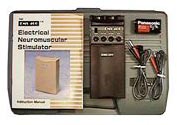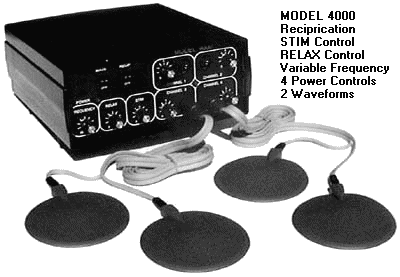

Electronic Muscle Stimulation, Neuromuscular Stimulation Therapy, EMS: This type of stimulation is characterized by a low volt stimulation targeted to stimulate motor nerves to cause a muscle contraction. Contraction/relaxation of muscles has been found to effectively treat a variety of musculoskeletal and vascular conditions. EMS differs from TENS in that it is designed to stimulate muscle motor nerves, while TENS is designed to stimulate sensory nerve endings to help decrease pain. BodyStim, EMS2000, EMS4000, EMS400, EMS179
Most common uses: Prevent or retard disuse atrophy, strengthening programs, reeducate muscles, postop orthopedic surgery, joint replacement, gait training, shoulder subluxation and reduction of muscle spasms.
Russian Muscle Stimulation: Russian Muscle stimulation is similar to EMS in that it is designed to Stimulate motor nerves. However, it is set at a frequency of 2500 Hz which allows for deeper muscle penetration and a more complete/stronger contraction of the muscle fibers. BodyStim, EMS2000R, EMS4000R
Most common uses: Muscle Building, Muscle Rehabilitation, Scoliosis Treatment
TENS, Transcutaneous Electrical Neural Stimulation: This type of stimulation is characterized by biphasic current and selectable parameters such as pulse rate and pulse width. TENS stimulates sensory nerves to block pain signals, stimulate endorphin production to help normalize sympathetic function. BodyStim Deluxe, TENS UNIT
Common uses: Acute and chronic pain, back and cervical muscular and disc syndromes, RSD, arthritis, shoulder syndromes, neuropathies, and many other painful conditions.
Interferential Stimulation, IF: This type of stimulation is characterized by the crossing of two electrical medium, independent frequencies that work together to effectively stimulate large impulse fibers. These frequencies interfere with the transmission of pain messages at the spinal cord level. Because of the frequency, the Interferential wave meets low impedance when crossing the skin to enter the underlying tissue. This deep tissue penetration can be adjusted to stimulate parasympathetic nerve fibers for increased blood flow. Interferential Stimulation differs from TENS because it allows a deeper penetration of the tissue with more comfort (compliance) and increased circulation. IF4000
Common uses: Pre and post-orthopedic surgery, joint injury syndrome, cumulative trauma disorders, increasing circulation and pain control of various origins.
Electro-Acupuncture: This type of stimulation is characterized by applying stimulation to specific acupuncture or trigger points on the body in small electrical impulses (milliamp/microamp) through acupuncture needles or with electro-stim hand held cutaneous probes. The frequency of stimulation may vary from 1 to 1,000 Hz. Lower frequencies (1 to 20) are tonifying, whereas, the higher frequencies (ie. greater than 50) are more sedating in nature. Electro-Acupuncture stimulation differs from TENS because TENS uses a higher voltage cutaneous stimulation.

